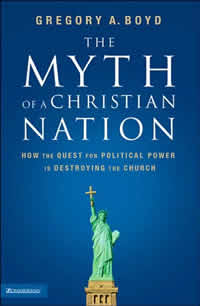Book Notes
 Gregory A. Boyd, The Myth of a Christian Nation; How the Quest for Political Power is Destroying the Church (Grand Rapids: Zondervan, 2006), 207pp.
Gregory A. Boyd, The Myth of a Christian Nation; How the Quest for Political Power is Destroying the Church (Grand Rapids: Zondervan, 2006), 207pp.
In April of 2004, pastor and scholar Greg Boyd preached a controversial series of six sermons called "The Cross and the Sword" at his 5,000 member Woodland Hills Church in Saint Paul, Minnesota. As he explains in his new book that grew out of these sermons, in those months preceding the elections, Boyd wanted to warn his congregation about "nationalistic and political ideology," of identifying the Christian Gospel with any political point of view, of cherished but badly mistaken convictions like the belief that America is a Christian nation, or that believers should "take back the nation for God." No, Boyd preached, "the path through politics is not the road to God." No, he would not endorse conservative candidates or announce anti-gay rallies from the pulpit. No, he would not distribute anti-abortion literature, pass out voter guides, or fly a flag in the sanctuary. Many parishioners thanked Boyd for his wisdom and boldness, but others were not so enamored. About a thousand people left the congregation.
Boyd makes a sharp distinction between the kingdom(s) of this world that are characterized by what he calls "power over," and the kingdom of God that Jesus announced which is characterized by "power under" (cf. especially Luke 22:25–27 and Philippians 2:1–11). The former is the realm of domination, exploitation, violence, coercion, and self-interest, the latter one of love and self-sacrifice. The kingdom that Jesus announced is a radical and counter-cultural alternative to every sort of worldly power, and not merely an attempt to upgrade government to a better level. Jesus, of course, insisted that his kingdom was "not of this world" (John 18:36). Most Christians until the baptism of Constantine lived this distinction, but in Boyd's view the developments after Constantine's conversion have constituted an unmitigated disaster: "The church of resident aliens became a horde of savage warlords. . . We have become intoxicated with the Constantinian, nationalistic, violent mind set of imperialistic Christendom."
Many others have written similar treatises with more theological and historical nuance (cf. God's Politics by Jim Wallis, Randall Balmer's new book Thy Kingdom Come, or Jon Meacham's American Gospel). He draws liberally from the works of Yoder, Willimon, Wink, and Hauerwas. Boyd's book is unique in that he writes from within and for an explicitly conservative readership. A recent article in the New York Times (July 30, 2006) featured the controversy at his church, and suggested possible broader trends in conservative evangelical churches (http://www.nytimes.com/2006/07/30/us/30pastor.html). We can only hope so.


